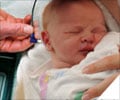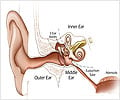Researchers have found that supporting cells in the ears of newborn mice can turn into sound-sensing hair cells.

The team's previous research revealed that inhibition of the Notch signaling pathway increases hair cell differentiation and can help restore hearing to mice with noise-induced deafness. In their latest work, the investigators found that blocking the Notch pathway increases the formation of new hair cells not from remaining hair cells but from certain nearby supporting cells that express a protein called Lgr5.
"By using an inhibitor of Notch signaling, we could push even more cells to differentiate into hair cells," says Dr. Edge. "It was surprising that the Lgr5-expressing cells were the only supporting cells that differentiated under these conditions."
Combining this new knowledge about Lgr5-expressing cells with the previous finding that Notch inhibition can regenerate hair cells will allow the scientists to design new hair cell regeneration strategies to treat hearing loss and deafness.
Source-Eurekalert














